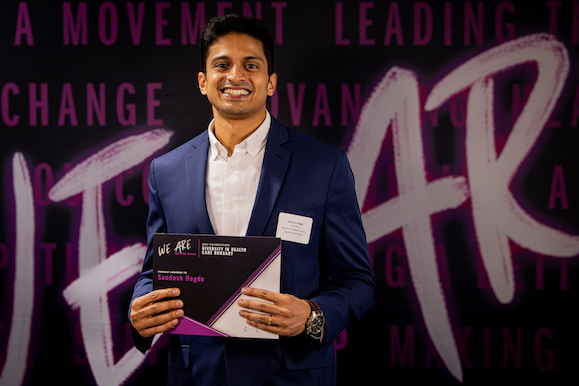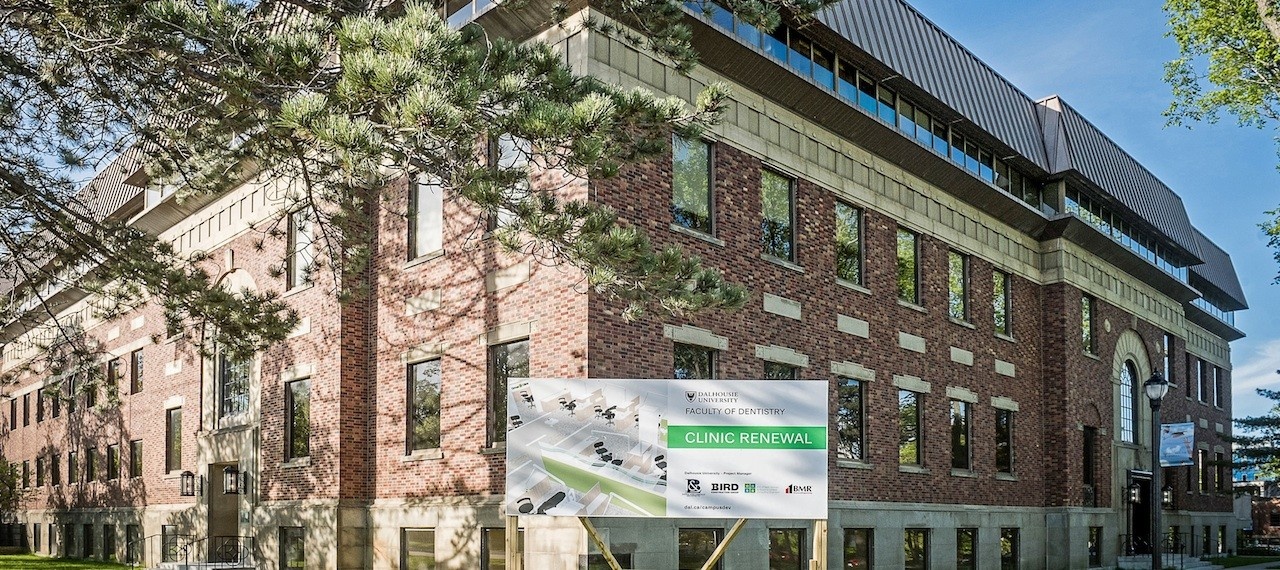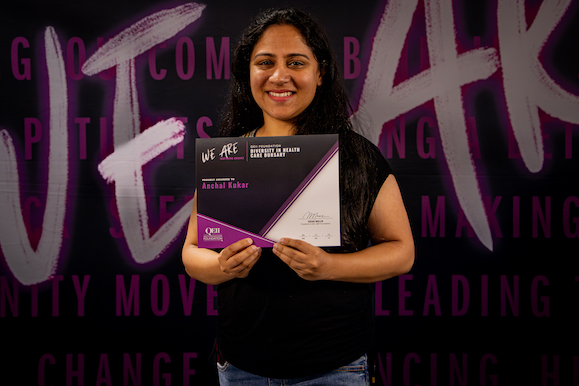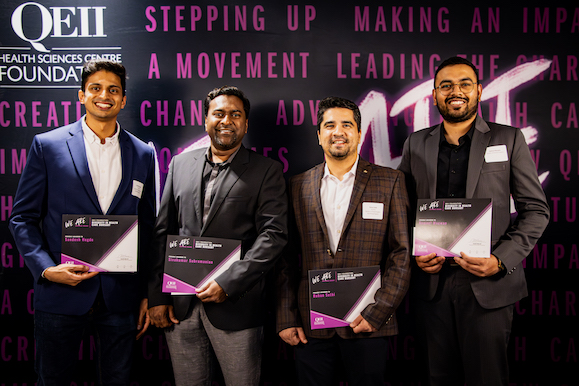News
» Go to news mainThe 2023 QEII Foundation Diversity in Health Care Bursaries: Part of this community
DDH student Anchal Kukar is the first dental hygiene student to receive a QEII Foundation Diversity in Health Care Bursary (Photos: QEII Foundation)
In September 2023, five Faculty of Dentistry students were presented with QEII Foundation Diversity in Health Care Bursaries. These bursaries are awarded each year to students from historically marginalized populations who are pursuing post-secondary education in a health-related profession here in Nova Scotia. Over the nine years these bursaries have been awarded, several have been presented to dentistry students. This year, Anchal Kukar became the first dental hygiene student to receive one.
The $1500 cheque was a welcome financial boost to Kukar, who was not eligible for provincial or federal funding loans. Perhaps more importantly, she says that it recognized her as an immigrant and made her feel "part of this community."
Kukar’s story begins in India, where she trained and worked as a dentist for five years. In 2020, she moved to Halifax as a permanent resident to be with her husband, who graduated with a master’s in computer science from Dalhousie in 2018. Initially employed as a dental assistant, Kukar learned about the profession of dental hygiene – virtually unknown in India – on the job. "I decided to go for it," says Kukar.
Kukar speaks positively about the dental hygiene program she will soon complete. “The experience of studying here is altogether different from back home,” she says. "The teachers are very friendly and like friends. Back in India, we see teachers as teachers."
She also speaks highly of the clinical training and how she learned things she was not taught before. "Here we are guided on how to adjust the light and how to wear gloves," she says. "All those little things give you so much confidence to work in the real world."
Now preparing to graduate in May, Kukar plans to find a job in Halifax. Although she would like to practise as a dentist again, the time and expense involved in re-qualifying here in Canada make it a project for the future.
l to r: Sandesh Hegde, Sivakumar Subamanian, Rohan Sethi, Samuel Macwan
The path to qualify in Canada
Other 2023 bursary recipients, Sandesh Hegde, Rohan Sethi, and Sivakumar Subramanian, arrived from India as specialist dentists in orthodontics, periodontics, and pedodontics, respectively. Samuel Macwan trained as a general dentist in Gujarat, India. For all of them, the path to re-qualifying in Canada has not been easy. Both Hegde and Sethi spent time working in Amazon warehouses before landing jobs as a dental assistant and a receptionist at a radiology clinic respectively – all the while studying for exams.
Subramanian says is "not a cakewalk to practise dentistry after entering Canada." Internationally trained dentists must either complete the direct licensing process (a three-part exam) or go through a two or three-year certification process at a university. At Dalhousie, the program is three years.
Hegde says that although the process to become a permanent resident of Canada was easy for him, he felt there was a period of limbo once he arrived. He says that there seems to be no process to help integrate the people who have been accepted into Canada as dentists. "You end up not being able to work in your profession for a long period, which is not good for your skills."
Despite the many challenges to get into dental school in Canada, all five bursary recipients are positive about their Dalhousie and Nova Scotia experiences. Macwan says that he has encountered some of the "most skilled and intelligent clinicians" at Dalhousie and become aware of the high level of digitalization and technological integration here.
Sethi says he appreciates living in a country that is more accepting of people from the LGBTQ community. Pay and work-life balance are also better for dentists here, he says.
What the bursary means
The QEII Diversity in Health Care Bursaries have been a welcome ray of sunshine for all the recipients – and not just for the money. The application requirement that they write three short essays about themselves and their health care aims prompted moments of reflection and revelation. Hegde says it made him think about what he was going to do "to serve the community" when he had reached the end of the process of becoming a health care worker. He and his wife (also a student in the Qualifying Program) hope to practise in a rural area.
Subramanian believes that bursaries and awards provide the motivation for students "to do better and inspire many to sharpen their skills."
For Macwan, the bursary application process not only provided an avenue for financial support, but also served as a catalyst for self-reflection on his professional aspirations. "It reignited my passion for community work and made me contemplate the significance of diverse representation in Canadian health care and the impact I want to make."
Above all, the bursaries are important for the sense of recognition each recipient feels. "The amount of money is secondary to representation," says Hegde. "If I represent a community, there are other people who will see themselves in me and think they can also do what I am doing."
Sethi appreciates that the QEII Foundation brought everyone together at the awards event to celebrate. It wouldn’t have been the same to receive a cheque in the mail. "It made us feel like we are not completely invisible," he says. "There is this foundation that cares about us and believes that we can be a big part of the society of Canada."
"I genuinely thank the QEII Foundation for recognizing me," says Subramanian.



